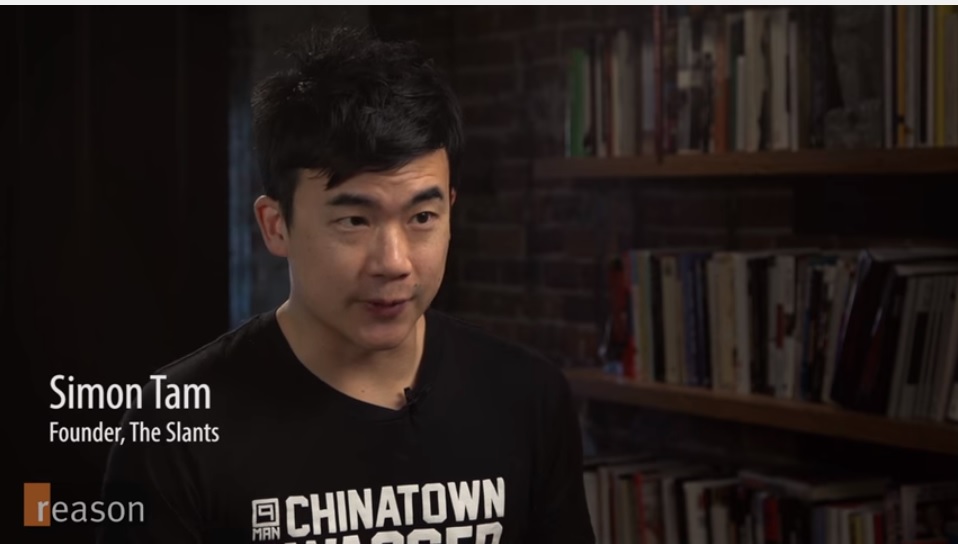![]()
軽蔑するおそれがある(May Disparage)商標登録の禁止は憲法違反
MATAL, INTERIM DIRECTOR, UNITED STATES PATENT AND TRADEMARK OFFICE v. TAM
CERTIORARI TO THE UNITED STATES COURT OF APPEALS FOR THE FEDERAL CIRCUIT
No. 15–1293. Argued January 18, 2017—Decided June 19, 2017
事実の概要
ロックグループ「The Slants」のリードシンガー、サイモン・タムは、アジア人に対する軽蔑的な言葉としてその侮辱する力を排除するためにこの名前(The Slants)を選んだ。 そして、彼は商標「THE SLANTS」を米国特許商標庁(USPTO)に商標登録出願した。USPTOは、「いかなる者(生存又は死亡にかかわらず)を軽蔑し,若しくはそれらとの関係を偽って示唆し,又はそれらを侮辱し若しくはそれらの評判を落とす虞のある」商標登録を禁止するという商標法の規定[Lanham Act 15U.S.C.§1052(a)]のもと、この商標の登録を拒絶した。
タム氏は、行政控訴手続を通じてこの拒絶決定を争ったが認められなかった。そこで、彼は、本件を連邦裁判所(CAFC)に訴えた。CAFC大法廷は、最終的に軽蔑条項(the disparagement clause)が修正第1条の表現の自由条項(Free Speech Clause)によれば表面的に違憲であると判決した。
特許商標庁は、本ケースを最高裁判へ上告した。
![]()

Simon Tam, lead singer of the rock group “The Slants,” chose this moniker in order to “reclaim” the term and drain its denigrating force as a derogatory term for Asian persons. Tam sought federal registration of the mark “THE SLANTS.” The Patent and Trademark Office (PTO) denied the application under a Lanham Act provision prohibiting the registration of trademarks that may “disparage . . . or bring . . . into contemp[t] or disrepute” any “persons, living or dead.” 15 U. S. C. §1052(a).
Tam contested the denial of registration through the administrative appeals process, to no avail. He then took the case to federal court, where the en banc Federal Circuit ultimately found the disparagement clause facially unconstitutional under the First Amendment’s Free Speech Clause.
![]()
判 旨
最高裁は、CAFC大法廷の判決を維持した。
Held: The judgment is affirmed.
![]()
検 討
アメリカにおいて現の自由が重視されることを示す判決である。わが国で本商標の登録が争われたならば、公序良俗違反かどうかの問題(商標法4条1項7号)となる。知財高裁の判決に対する上告が認められないことは明かであろう。
判決後のLanham Act 2条(a)の軽蔑条項に対する審査ガイドライン及び同項のスキャンダル条項に従う審査遵守事項が変更されている。
※
New Examination Guide Issued on Section 2(a) after Matal v. Tam| USPTO
Lanham Actの2条(a),15 U.S.C. §2(a),では、不道徳またはスキャンダルな事項(「スキャンダル規定」)、または、人、機関、信念、もしくは国家のシンボルを侮辱するおそれのある事項、またはそれらを軽蔑もしくは不評判にする事項(「軽蔑規定」)からなる、または、含む標章の登録を禁止する。
本判決で、最高裁判所は、軽蔑規定が修正第1条の自由発言条項に違反しているというCAFC判決を支持した。したがって、軽蔑する・・・、もしくは引き起こすおそれがある、または、卑劣な可能性がある商標は、もはや登録を拒否したり、登録を取り消したりする有効な理由ではない。
スキャンダル条項の合憲性は、ブルネッティの連邦巡回控訴裁判所(15-1109 FC)に係属しているため、引き続き商標審査手順(TMEP)と審査ガイド01-16に従って審査する。
※ 合衆国憲法修正第一条[信教・言論・出版・集会の自由、請願権][1791年成立]
連邦議会は、国教を定めまたは自由な宗教活動を禁止する法律、言論または出版の自由を制限する法律、ならびに国民が平穏に集会する権利および苦痛の救済を求めて政府に請願する権利を制限する法律は、これを制定してはならない。
The First Amendment of the U. S. Constitution[including the Religion Clause, the Free Speech Clause, the Establishment Clause, and the Free Exercise Clause]
Congress shall make no law respecting an establishment of religion, or prohibiting the free exercise thereof; or abridging the freedom of speech, or of the press; or the right of the people peaceably to assemble, and to petition the Government for a redress of grievances.
※ 合衆国商標法 ランハム法 Lanham Act 第2条(15 U.S.C.§1052)
商標は主登録簿に登録することができる;同時登録
出願人の商品を他人の商品から識別することを可能にする商標は,その性質を理由として,主登録簿に登録することを拒絶されることはない。ただし,その商標が次に該当するときはこの限りでない。
(a) 次のものから成り又はそれらを含むこと。不道徳的,欺瞞的若しくは中傷的な事項(スキャンダル規定);又はある者(生存しているか死亡しているかを問わない),団体,信仰若しくは国民的な象徴を軽蔑し,若しくはそれらとの関係を偽って示唆し,又はそれらを侮辱し若しくはそれらの評判を落とす虞のある事項(軽蔑規定);又は地理的表示であって,ぶどう酒若しくは蒸留酒に付して又は関連して使用される場合に,その商品の原産地以外の場所を特定するものであり,かつ,出願人によって,(第19巻第3501条(9)に定義されている)WTO協定が合衆国に対して効力を生ずる日から1年以後に初めてぶどう酒若しくは蒸留酒に付して又は関連して使用されているもの。
§1052 TRADEMARKS REGISTRABLE ON PRINCIPAL REGISTER; CONCURRENT REGISTRATION
No trademark by which the goods of the applicant may be distinguished from the goods of others shall be refused registration on the principal register on account of its nature unless it—
(a) Consists of or comprises immoral, deceptive, or scandalous matter; or matter which may disparage or falsely suggest a connection with persons, living or dead, institutions, beliefs, or national symbols, or bring them into contempt, or disrepute; or a geographical indication which, when used on or in connection with wines or spirits, identifies a place other than the origin of the goods and is first used on or in connection with wines or spirits by the applicant on or after one year after the date on which the WTO Agreement (as defined in section 3501(9) of title 19) enters into force with respect to the United States.
以 上
米国裁判所事件についてご相談を承ります。
